
The Texas Digital Newspaper Program on The Portal to Texas History has reached a huge milestone of over one-million newspaper issues openly available!
These one-million newspaper issues comprise 11,256,533 pages, contributed by 226 partners from across Texas, and representing 210 counties.
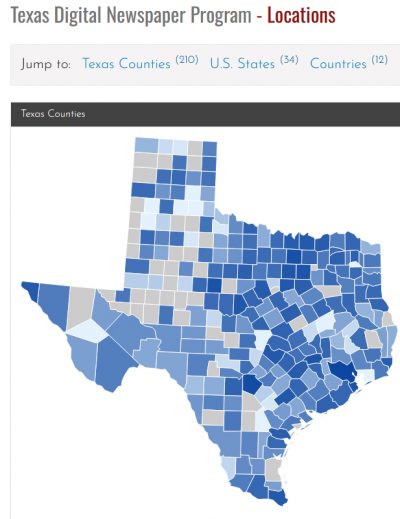
Multiple partners have helped to build the Texas Digital Newspaper Program Collection, to make it the largest, single-state, openly accessible digital newspaper repository in the U.S. These include:
- The Abilene Library Consortium, who has supported addition of over 44,000 newspaper issues,
- Sterling Municipal Library in Baytown, with a collection hosting over 29,000 newspaper issues,
- Denton Public Library, hosting over 19,000 newspaper issues,
- And the Texas State Library and Archives Commission began a new newspaper collection last year that is now just over 14,000 issues.
The staff in the Digital Newspaper Unit get to handle almost every newspaper that is uploaded into the TDNP collection, and we all have a favorite newspaper title, masthead, or time period. Tim Gieringer, who oversees the newspaper descriptions for what you see in the Texas Digital Newspaper Program, loves a good masthead. He says that two titles, in particular, have stood out to him: The Palacios Beacon and Diogenes.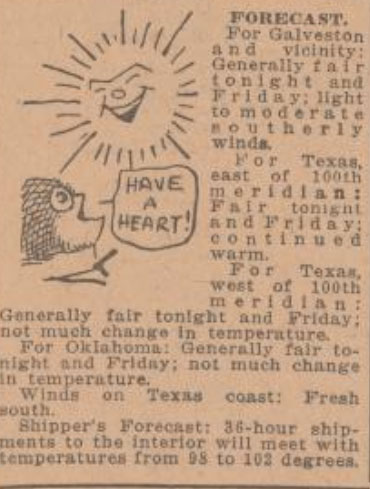 Brooke Edsall, the head of the physical page and large-format scanning area, has said that her favorite newspaper collections are The Galveston Tribune and The Ennis Daily News. Hannah Lindsey, who oversees newspaper issue processing, says that her favorite newspapers are the Beeville Bee, the Houston Informer, and Svoboda. Sarah Lynn Fisher, former staff member of the Newspaper Unit and now Digital Collections Librarian, reports that she loves all of the local Denton newspapers, including UNT’s own NT Daily, the Denton Record-Chronicle, and her hometown newspaper, The Allen American. As the person who has worked with all the partners across Texas to add their newspapers, I’m not sure how to begin choosing a favorite title, though I do love reading through the Spanish-language newspapers, civil rights newspapers, like The Chicano Times, and this wacky handwritten, Union POW camp newspaper, The Old Flag.
Brooke Edsall, the head of the physical page and large-format scanning area, has said that her favorite newspaper collections are The Galveston Tribune and The Ennis Daily News. Hannah Lindsey, who oversees newspaper issue processing, says that her favorite newspapers are the Beeville Bee, the Houston Informer, and Svoboda. Sarah Lynn Fisher, former staff member of the Newspaper Unit and now Digital Collections Librarian, reports that she loves all of the local Denton newspapers, including UNT’s own NT Daily, the Denton Record-Chronicle, and her hometown newspaper, The Allen American. As the person who has worked with all the partners across Texas to add their newspapers, I’m not sure how to begin choosing a favorite title, though I do love reading through the Spanish-language newspapers, civil rights newspapers, like The Chicano Times, and this wacky handwritten, Union POW camp newspaper, The Old Flag.
All of the newspaper issues you see in the Texas Digital Newspaper Program represent conversations and people who have worked hard to preserve and build access to history, and while we mention some titles here, we value every single page and every single person who has helped to grow this collection.
Access to the newspapers available in the Texas Digital Newspaper Program has been supported by multiple financial donors, including the National Endowment for the Humanities, through the National Digital Newspaper Program; the Texas State Library and Archives Commission TexTreasures Competitive Grant Program, funded by the Institution of Museum & Library Services Library Services Technology Act; the Tocker Foundation; the Summerlee Foundation; the Ladd & Katherine Hancher Foundation; and the Matagator Foundation.




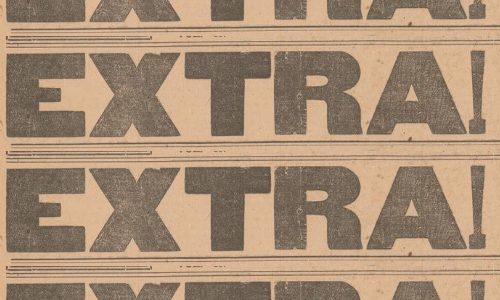




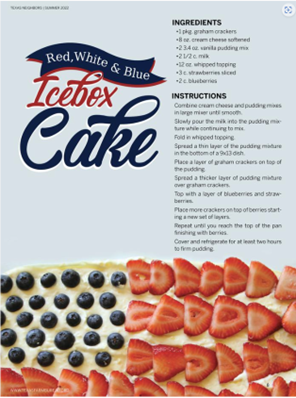 This no-bake dessert is a showstopper with its layers of creamy filling, graham crackers, and fresh berries. It is a perfect fit for the patriotic theme of the day. (
This no-bake dessert is a showstopper with its layers of creamy filling, graham crackers, and fresh berries. It is a perfect fit for the patriotic theme of the day. (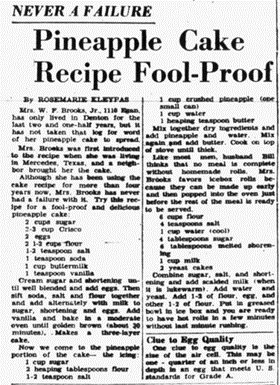
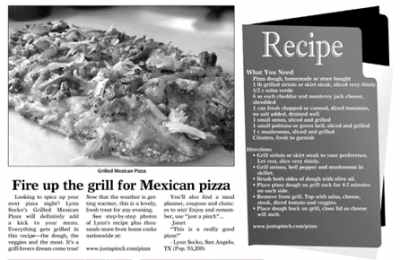
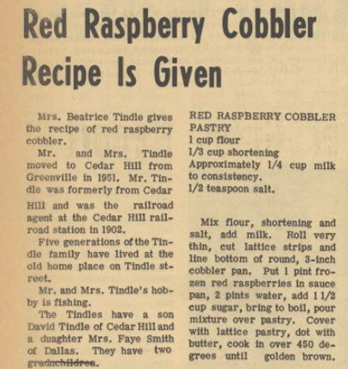 The Cedar Hill Chronicle has you covered because raspberries are in season, making this red raspberry cobbler the perfect choice for a summer celebration. The vibrant color and juicy berries are sure to be a hit. (
The Cedar Hill Chronicle has you covered because raspberries are in season, making this red raspberry cobbler the perfect choice for a summer celebration. The vibrant color and juicy berries are sure to be a hit. (
 Fire up the grill and treat your guests to these mouthwatering char-grilled beef burgers. They are a true crowd-pleaser and a must-have for any 4th of July celebration. (
Fire up the grill and treat your guests to these mouthwatering char-grilled beef burgers. They are a true crowd-pleaser and a must-have for any 4th of July celebration. (